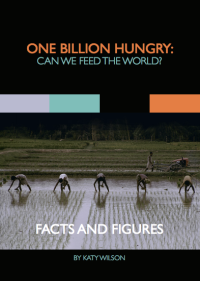 In conjunction with World Food Day last week, the International Institute of Environment and Development (IIED), Overseas Development Institute (ODI), and Institute of Development Studies (IDS) launched a series of seven papers investigating the key agricultural development debates surrounding sub-Saharan Africa.
In conjunction with World Food Day last week, the International Institute of Environment and Development (IIED), Overseas Development Institute (ODI), and Institute of Development Studies (IDS) launched a series of seven papers investigating the key agricultural development debates surrounding sub-Saharan Africa.
For many years the importance of agricultural development for poverty and hunger eradication was a key issue to be argued, debated and championed but more recently this message has been largely accepted with agriculture becoming a central theme on African and international development agendas. As World Food Day showed there is general agreement that smallholder and family farms play a critical role in providing food security, livelihoods, environmental protection and rural development.
Although investing in agricultural development, and smallholders specifically, is widely believed to help tackle poverty and hunger, the way of going about this is much contested, and debates over the right policies, technologies and investments are ongoing. It is these debates that these seven papers, the first of twelve, have explored, in particular looking at how such debates have changed since 2001 and the release of an issue of Development Policy Review entitled “Rethinking rural development“. This issue suggested that the role of agriculture in driving development and economic growth was diminishing with more people leaving the sector to pursue other jobs.
Today agriculture is largely seen as both critical to a country’s economic transition and, because the sector employs millions of people and families, as a route to improving the livelihoods of people around the world. Perhaps this is because the way agriculture is viewed has changed – within agricultural development spheres discourse is as often as not full of ideas such as market development, value chains, public-private partnership and enterprise. Agriculture in developing countries is being viewed as a business with risks but also with many opportunities. Recent rises in food prices, liberalisation of markets, the rise of regional trade and economic partnerships in Africa, and new African institutions such as the Comprehensive Africa Agriculture Development Programme (CAADP) have opened the door for agriculture-led development and private investment.
Whether these developments will ultimately be good or bad for African development divides opinion. Do market-led approaches marginalise subsistence farmers, increasing their vulnerability to poverty? Will small-scale farmers ultimately have to leave farming as commercial farms capitalise on market opportunities? How much control over the development of farms and agriculture should individual farmers have? The seven papers presented aim to ignite debate on how African agriculture is changing and shed light on the way forward. The topics of these papers ranges from the changing African economic, political and social landscapes and its impact on food systems; the types of investment most appropriate for smallholder farmers, given their heterogeneity; economic diversification and the link between urban and rural economies; the potential of input subsidy programmes; and the role of ICTs.
Here we suggest some key agricultural debates currently taking place but we’d love to hear from you as to what you think the most important debates are in African agricultural development, and how you think resolution can be found. [Read more…]









